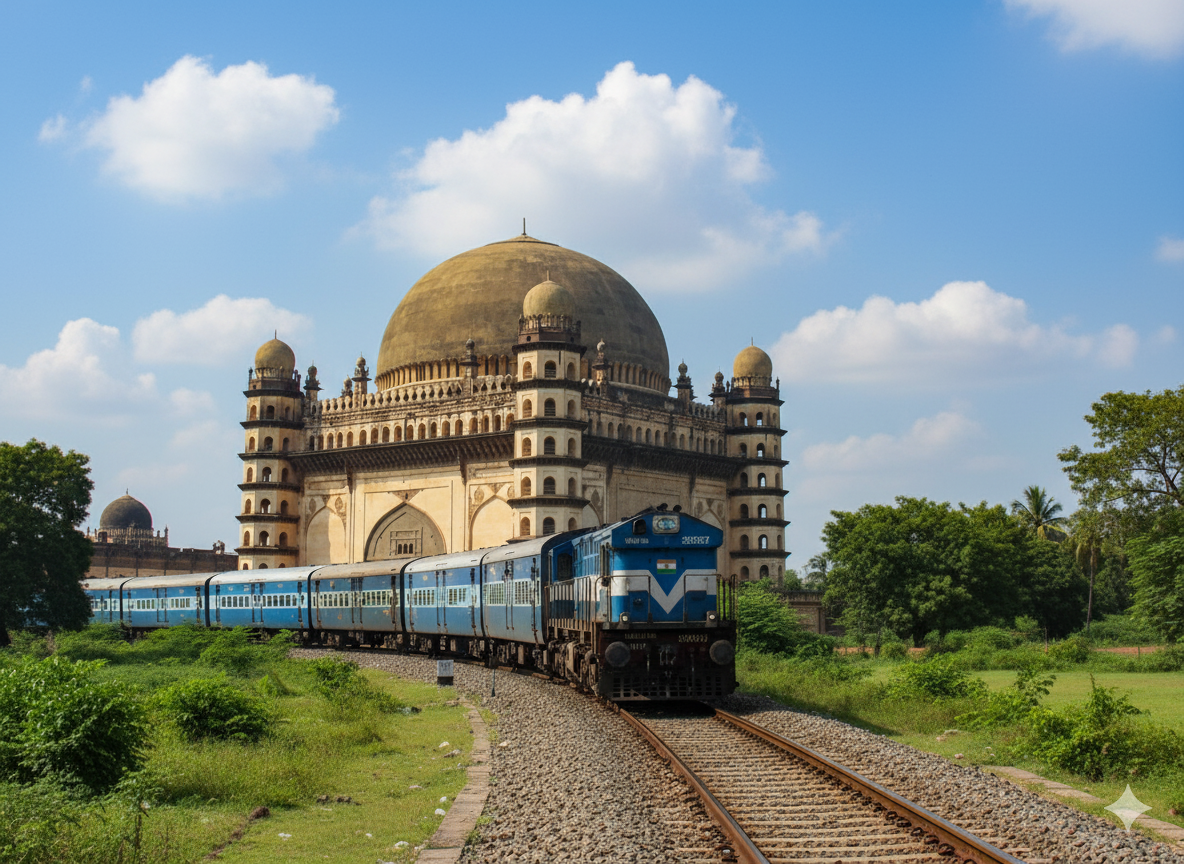The Changing Face of Vijayapura’s Local Economy

Introduction
Vijayapura, the historic city in northern Karnataka, is undergoing a quiet economic transformation. Once predominantly reliant on agriculture and traditional commerce, the district’s economy now reflects a more diverse profile driven by expanding markets, construction activity, retail services, and evolving agricultural practices. The bustling bazaars of the old city continue to anchor local trade, while new commercial corridors and infrastructure projects signal growing urbanization and investment. Understanding these shifts is crucial for policymakers, businesses, and residents alike as Vijayapura charts its economic future in the decades ahead.
Sector Highlights
Markets and Bazaars
The traditional marketplaces of Vijayapura—from the vibrant cloth and jewelry bazaars near Gol Gumbaz to the agricultural wholesale mandis—remain vital economic hubs. These markets serve not only the city but also surrounding talukas, facilitating trade in textiles, grains, pulses, and livestock. According to a 2023 report by the Karnataka Department of Commerce, Vijayapura’s APMC (Agricultural Produce Market Committee) markets handled over ₹1,200 crore worth of agricultural produce annually, underscoring their continued importance.
Construction and Infrastructure
The construction sector has emerged as a significant economic driver, fueled by government infrastructure projects and private real estate development. The expansion of highways connecting Vijayapura to Bengaluru and Maharashtra, along with ongoing road improvements under the Pradhan Mantri Gram Sadak Yojana, has created employment and attracted contractor firms to the region. The District Industries Centre (DIC) Vijayapura reported a 22% increase in registered construction-related MSMEs between 2021 and 2023, reflecting sustained sectoral growth.
Agriculture
Agriculture continues to be the backbone of Vijayapura’s economy, with major crops including jowar, wheat, pulses, sugarcane, and cotton. However, the sector faces challenges from erratic rainfall and water scarcity. Recent data from the Karnataka State Agriculture Department indicates that Vijayapura contributes approximately 8-10% of the state’s total pulse production. Efforts to promote drip irrigation and crop diversification have shown promise, with government schemes targeting sustainable farming practices gaining traction among progressive farmers.
Retail and Services
Retail commerce has expanded significantly, with new shopping complexes, branded stores, and service establishments opening across Vijayapura. The Deccan Herald noted in a 2024 feature that the city’s retail footprint has grown by nearly 30% in the past five years, driven by rising disposable incomes and changing consumer preferences. Banking, healthcare, education, and hospitality services have similarly expanded, creating white-collar employment opportunities for the educated youth.
Small Business and MSMEs
Small and medium enterprises, particularly in food processing, textile manufacturing, and engineering workshops, form a critical component of the local economy. The District Industries Centre has facilitated financial linkages and skill development programs to support MSME growth. The Hindu reported in early 2024 that Vijayapura had over 4,500 registered MSMEs, employing an estimated 35,000 people directly.
Official Data and Economic Figures
While comprehensive GDP data at the district level is not always publicly available, sectoral performance indicators provide valuable insights. The Karnataka Economic Survey 2023-24 highlighted that the Kalyana-Karnataka region, which includes Vijayapura, recorded a Gross District Domestic Product (GDDP) growth rate of approximately 6.8% in FY 2022-23, slightly below the state average but showing steady progress. Investment in the region under the Karnataka Industrial Policy has attracted ventures in agro-processing and renewable energy, with cumulative proposed investments exceeding ₹2,500 crore over the past three years.
Employment data from the District Employment Exchange indicates that registration for jobs in the construction, retail, and services sectors has risen by 18% year-on-year, reflecting both opportunities and unmet demand for skilled labor. The APMC markets continue to generate seasonal employment for thousands of agricultural workers, traders, and transporters.
Challenges and Opportunities
Local Investment and Capital Access
Access to formal credit remains a challenge for small entrepreneurs and farmers. While nationalized banks and cooperative institutions are present, awareness of government schemes like the Mudra Yojana and Start-Up Karnataka is limited in rural pockets. Bridging this information gap could unlock significant entrepreneurial potential.
Infrastructure Development
Though progress has been made, gaps in road connectivity, reliable power supply, and logistics infrastructure continue to constrain economic activity. The ongoing Smart City initiatives and proposed industrial corridors offer long-term promise but require sustained public and private investment.
Digital Adoption
Digitalization presents both a challenge and an opportunity. While urban merchants and service providers are increasingly adopting digital payments and e-commerce platforms, rural businesses lag behind. Government-led digital literacy campaigns and connectivity improvements under BharatNet are gradually addressing these disparities.
Labor and Skills
A skilled workforce is essential for sustained economic growth. Vijayapura’s Industrial Training Institutes (ITIs) and polytechnics are expanding capacity, yet a mismatch persists between available skills and industry requirements. Collaboration between educational institutions, industry, and government is critical to align training with market needs.
Future Outlook
Looking ahead, Vijayapura’s economic prospects appear cautiously optimistic. Several trends are likely to shape the district’s trajectory over the next decade:
Agricultural Modernization: Continued investment in irrigation infrastructure, mechanization, and value-addition in agriculture could enhance farmer incomes and reduce rural-urban migration.
Infrastructure-Led Growth: Completion of highway projects and expansion of industrial estates are expected to attract manufacturing and logistics firms, diversifying the economic base.
Renewable Energy: Vijayapura’s abundant sunshine makes it a strong candidate for solar energy projects. Government initiatives promoting renewable energy could position the district as a regional hub for clean power generation.
Tourism and Heritage: With world-renowned monuments like Gol Gumbaz and Ibrahim Rauza, heritage tourism has untapped potential. Enhanced marketing, hospitality infrastructure, and connectivity could boost visitor numbers and related services.
Digital Economy: Expanding broadband access and digital literacy will enable local businesses to participate in e-commerce and online services, opening new revenue streams.
According to projections by the Karnataka Planning Department, the Kalyana-Karnataka region—anchored by districts like Vijayapura—is targeted to achieve higher per capita income parity with state averages by 2030 through focused interventions in infrastructure, education, and industrialization.
Conclusion
The changing face of Vijayapura’s local economy reflects a district in transition—balancing tradition with modernity, agriculture with urbanization, and local enterprise with global trends. While challenges such as infrastructure gaps, skill shortages, and water scarcity persist, the foundations for diversified and inclusive growth are being laid. For policymakers, investors, and the community, the coming years present a pivotal opportunity to shape an economic landscape that honors Vijayapura’s storied past while embracing a dynamic and sustainable future.
Sources:
- Karnataka Department of Commerce – APMC Market Reports, 2023
- District Industries Centre (DIC), Vijayapura – MSME Registration Data, 2021-2023
- Karnataka State Agriculture Department – Pulse Production Statistics
- Deccan Herald – “Retail Boom in Tier-II Karnataka Cities” (2024)
- The Hindu – “MSMEs Drive Employment in North Karnataka” (2024)
- Karnataka Economic Survey 2023-24
- Karnataka Planning Department – Regional Development Projections



